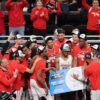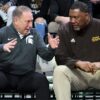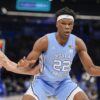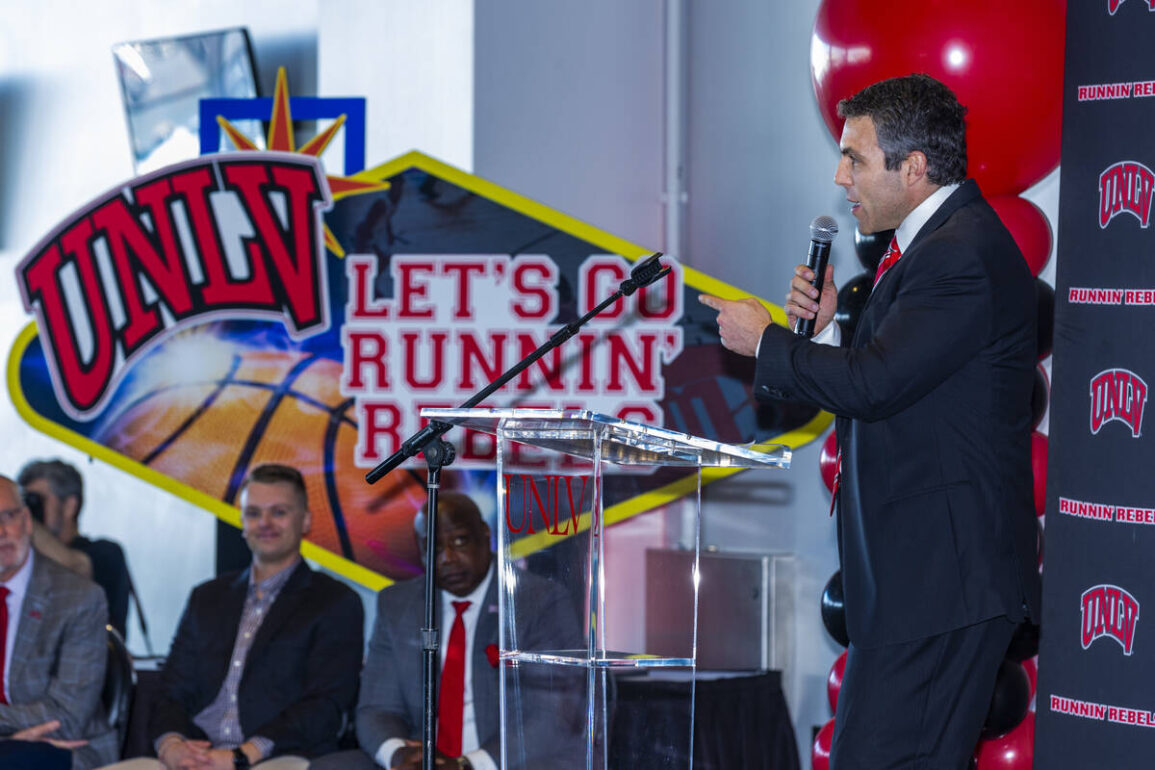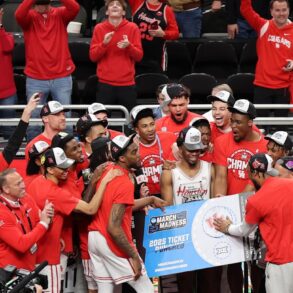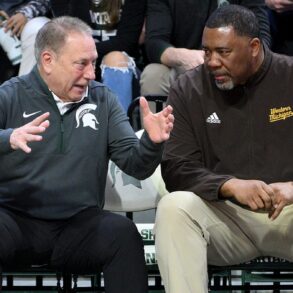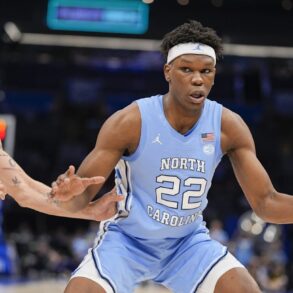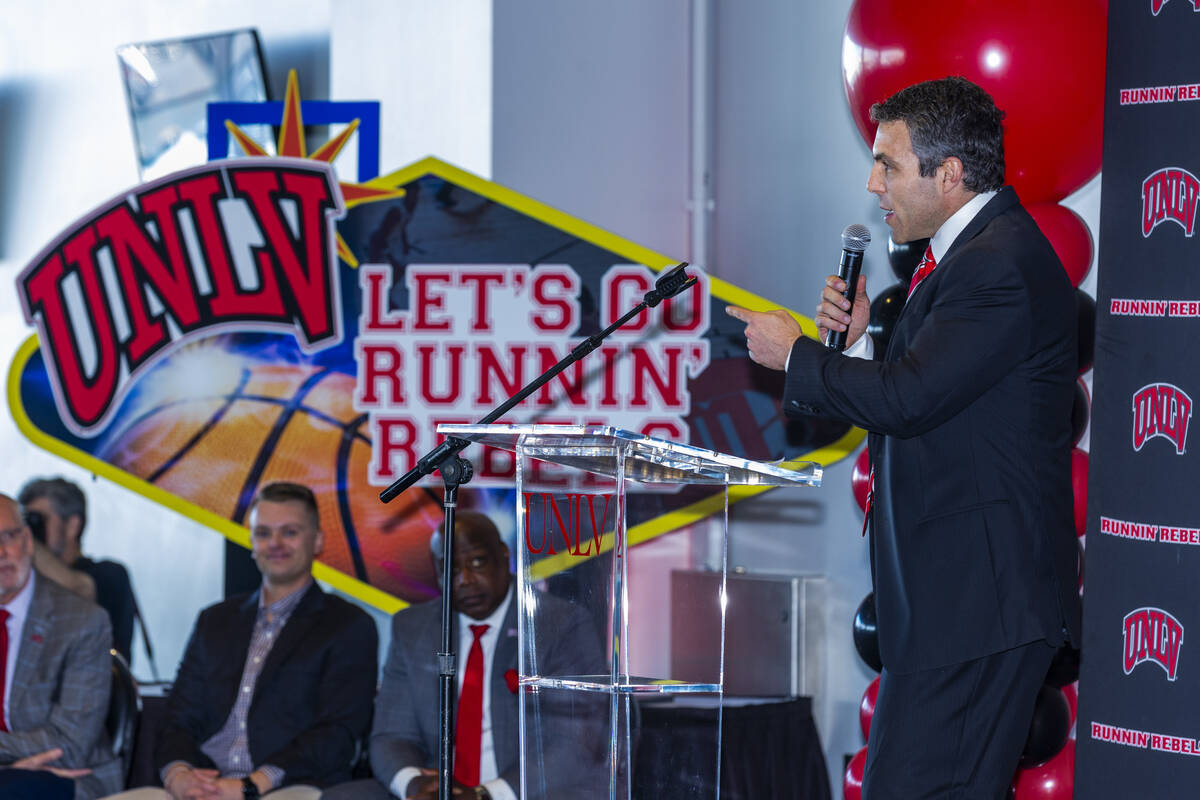
There isn’t much to be said with certainty about the current college basketball landscape, but Josh Pastner knows one thing to be true:
“It’s a totally different world,” the new UNLV men’s basketball coach said in an interview with the Review-Journal.
Two years removed from his previous head coaching role at Georgia Tech, the 47-year-old didn’t miss a beat when he was hired to replace Kevin Kruger in March.
Despite the competitive nature of the transfer portal amid the name, image and likeness era, Pastner led the Rebels through a complete roster overhaul that will welcome newcomers from the SEC, Big Ten and Big 12.
The recruiting class is headlined by 6-foot-7-inch Alabama freshman Naas Cunningham, who will be joined in the frontcourt by High Point senior Kimani Hamilton, Arizona freshman Emmanuel Stephen and Iowa sophomore Ladji Dembele.
Pastner’s haul of guards included UC Irvine junior Myles Che, Texas-Rio Grande Valley junior Howard Fleming, Louisiana Tech senior Al Green and Illinois sophomore Dra Gibbs-Lawhorn.
When point guard Dedan Thomas Jr., the team’s leading scorer, left UNLV and committed to LSU, it became clear that Pastner would be starting from scratch. The Rebels won’t return a single starter from last season after the departures of forward Jeremiah “Bear” Cherry to Sacramento State and guard Jaden Henley to Grand Canyon.
UNLV also lost key bench pieces Jailen Bedford (Virginia Tech), Brooklyn Hicks (Montana) and Pape N’Diaye (Xavier), along with Jace Whiting (Weber State) and Rob Whaley Jr. (Kent State), who each missed all but the first two games of last season.
While the tight timeline to replace players would be a daunting task for some, Pastner described it as a breath of fresh air that he looked forward to while working as a TV analyst for networks like ESPN, Peacock, and CBS Sports Network during his time away from coaching.
“Doing television, I can’t tell you how many times talking to different coaches (I’d hear) how much they did not like the landscape,” he said. “I actually enjoy this.”
Embracing portal
In Pastner’s view, the biggest change in college basketball recruiting comes down to the timeline.
From his tenure as an assistant at Arizona to his head coaching days at Memphis and Georgia Tech, Pastner still remembers the era of “pursuing a prospect for three, maybe four years,” he said.
After being consistently courted for so long, players would cut their lists down to a few schools, take official visits and eventually land on their long-term home.
“At the end, they say they’re going somewhere else, and it’s devastating. Or if you win and get the guy, you’re so excited,” Pastner said. “The difference right now is everything is streamlined. Instead of two to three years, it’s two to three weeks. And it’s so much quicker. … So I love this, because I’m all about efficiency. Less is more.”
But a quick process doesn’t mean a haphazard one. Pastner said he’s prioritizing being “really good in evaluation,” raising NIL money and molding players into better talents.
As someone who believes his career has “survived on player development,” Pastner understands his coaching approach might not be everyone’s cup of tea — and he’s not going to change.
“You’ve got to coach your team demanding such great excellence, accountability and discipline, with the assumption that they’re all going to go in the portal next year,” Pastner said. “You can’t coach trying to keep guys. You’ve just got to coach them hard, try to do the best you can for the team. And then you might have to start all over in the following year, but that’s OK.”
Transparency, flexibility
When asked what he would target if he could alter any aspect of the NIL framework or rules, Pastner suggested something like a database of offer sheets.
“In the NBA, or pro sports, if a team is offering somebody something, the other team has a chance to match it and they know what they’re offering,” he said. “… (In college sports) you don’t know if you’re out bidding against yourself. You’re doing a best-guess estimate because you don’t know what the other schools are doing.
“I wish there was more transparency from everybody in college basketball.”
Pastner has used the same principle as the foundation of his recruiting. He won’t disclose specific NIL contract details of one player to another because he views it as personal and confidential, but said that he made sure to let every recruit know “where they stand” in the locker room.
Pastner said he also only recruited players he believed view “winning a possession as more important than breathing.” He and his new staff used the slogan “toughness and shooting” as they built the roster.
At one point during the portal madness, Pastner said he and his assistants thought they’d secured a “high-level player.” After some promising exchanges in which the prospect seemed excited to join the Rebels, Pastner said his team arranged to meet with him virtually one morning — but the recruit didn’t show up and no one could get ahold of him.
Hours after the scheduled time, he claimed to have overslept.
“So we went to somebody else,” Pastner said. “It wasn’t going to be the right fit. You’ve got to get ready to move on to the next deal.”
Pastner wants his roster to have the same flexibility as his staff when his first season at the helm of the Rebels begins.
“If you have a tough loss, or you’re in a tough stretch, how do you bounce back (from) that quickly?” he said. “You’ve got to move on to the next thing and not dwell on the past.”
Contact Callie Fin at cfin@reviewjournal.com. Follow @CallieJLaw on X.
This post was originally published on this site be sure to check out more of their content.


